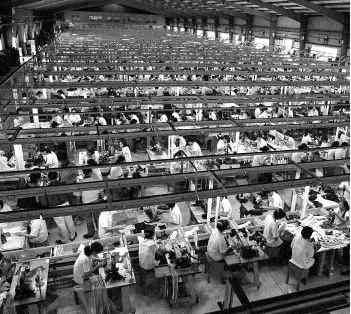
The 'Factory Model' of Education
Apr 28, 2015
This is a great article. It offers some (much needed) historical context to the claims often made by school reform advocates that our education system is structurally analogous to the factory system as it existed over one hundred years ago.
These same reform advocates often valorize educational technology as a means of radically changing our broken education system and reformulating it in a modern context. I actually just heard a keynote speaker at the ATLIS conference a couple of weeks ago use the old 'our education system is hopelessly outmoded because it was modeled on the Prussian system of universal education which was specifically designed to educate the population for factory work' argument.
I do not disagree that there are a lot of problems with education (preK all the way up to University) in the U.S. but I think we have to accept the reality that schools are not in business solely to teach abstract ideas. Schools are embedded in the social fabric of nations. They exist as much to provide socialization into a system of laws and norms as they do to teach kids math, reading, writing, etc. Eugen Weber outlines how schools came to serve this function in his seminal work "Peasants into Frenchmen: The Modernization of Rural France 1870-1914". Furthermore, schools do not have infinite resources. The structure of schools must always reflect the practical need for a small number of adults to manage a large number of children. Independent schools often have fewer students per teacher and so have more leeway to experiment. In public schools where teachers often have many more students per class, it is difficult to conduct school without resorting to strategies that may be reminiscent of factory style discipline.
Having said that, I am currently reading a book by the keynote speaker I mentioned above that I would highly recommend: http://www.amazon.com/EdJourney-Roadmap-Future-Education/dp/1118898583 Despite his possible misuse of the Factory/Education analogy, I think Grant Lichtman's ideas are really sound and well articulated in this book.